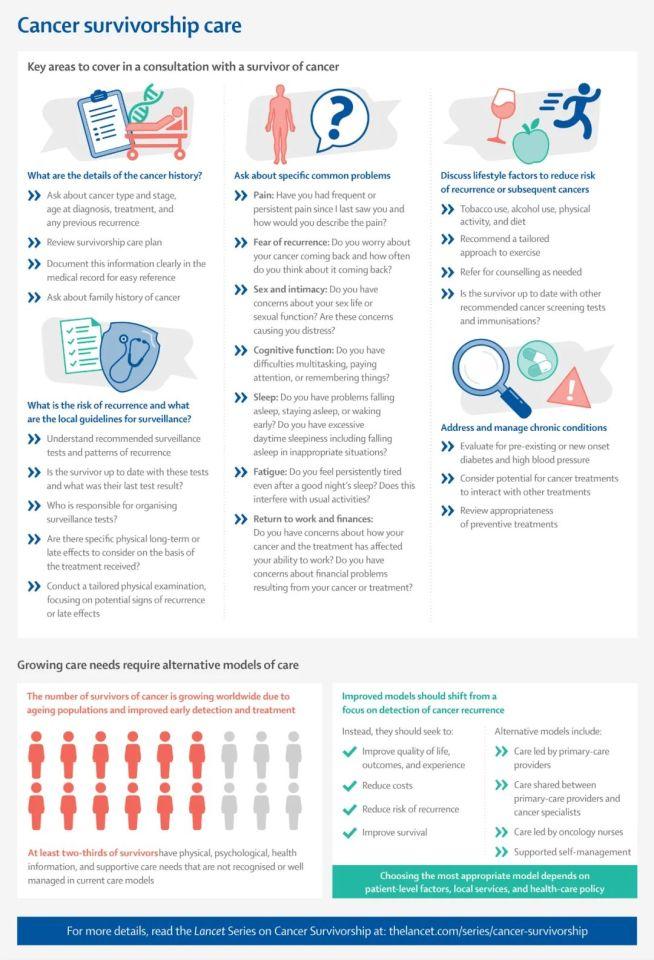1
Common clinical problems experienced by cancer survivors are managed
Improvements in early detection and treatment have led to an increasing number of cancer survivors worldwide. Care models do not adequately address the broad range of physical, psychosocial and supportive care needs of cancer survivors. In this article, we summarize the management evidence surrounding common clinical issues experienced by adult cancer survivors and how to address them in counseling.
Review the patient's cancer and treatment history, emphasize the need to consider potential long-term or delayed effects, and recommend monitoring for recurrence. Physiological outcomes that require identification of specific treatments include cardiac dysfunction, metabolic syndrome, lymphedema, peripheral neuropathy, and osteoporosis. Immunotherapy can elicit specific immune-related responses, most commonly in the gastrointestinal tract, endocrine system, skin, and liver. Pain should be screened for and needs to be evaluated for its underlying cause and non-pharmacological and pharmacological management pathways.
Common psychosocial problems, including fear of relapse, fatigue, changes in sleep and cognition, as well as effects on sexual and intimate relationships, finances, and employment, have effective psychosocial therapies. There is a need to review lifestyle factors, including smoking, obesity and alcohol consumption, to reduce the risk of recurrence and secondary cancer. Exercise can improve quality of life and possibly cancer survival; it can also help manage fatigue, pain, metabolic syndrome, osteoporosis, and cognitive impairment. Using supportive care screening tools, such as a "psychological distress thermometer," you can identify specific areas of concern and help identify priorities to address in counseling.

2
Model of care improvement for cancer survivors
The number of cancer survivors is increasing dramatically. Current care models are unsustainable and do not meet the many unmet needs of cancer survivors. Many trials have looked at other care models, including primary care provider-led care, care provided by oncologists and primary care providers, and oncology nurse-led care. These alternative models appear at least as effective as expert-led care and apply to many cancer survivors. Choosing the most appropriate care model for each patient depends on patient factors (such as risk of long-term effects, delayed impacts, personal willingness and self-management capacity) as well as local service and medical service policies. Wider implementation of alternative models requires appropriate support for non-oncology care providers and the support of cancer treatment teams and their patients.
The COVID-19 pandemic has driven some more patient-centered changes in practice that should continue. The improved model should shift from primarily detecting cancer recurrence to improving the quality of life, functional outcomes, experience and survival rates of cancer survivors, reducing the risk of cancer recurrence and new occurrence, improving the management of comorbidities, and reducing patient and payer costs. The articles on this album focus on high-income countries, as most of the data comes from these countries. However, future studies should consider the applicability of these models in a wider healthcare setting and in more cancers.
3
Long-term care for people who have been treated for cancer during childhood and adolescence
Advances in the treatment and supportive care of childhood and adolescent cancer patients worldwide are making more and more survivors grow into adults. However, this group is at great risk of late-onset health problems, including significant increases in morbidity and premature mortality. Barriers to providing quality care to this group are unique, including asymmetric doctor-patient information and fragmented care during the transition from paediatrics to adult care.
Childhood and adolescent cancer survivors are at risk of a range of delayed side effects from treatment, including heart, endocrine, lung, fertility, renal, psychological, cognitive, and social development. Coordinating care and transitioning to adult care is a huge challenge, but it can empower survivors and improve outcomes, and can be facilitated through clear, effective communication and support for self-management. Resources available to adult clinical care teams and primary care providers include delayed impact monitoring guidelines and web-based support services.
Tumor prevention and treatment
Caption Image Copyright Rawpixel.com/Shutterstock
Chinese translations are for reference only, and all content is based on the original English text.